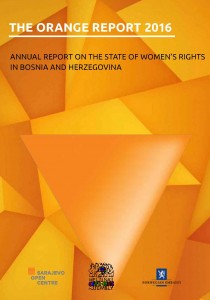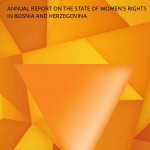The Orange Report 2016: HUMAN TRAFFICKING
 BiH is a country of origin, destination and transit for women, children and men who are victims of human trafficking. The poor socio-economic situation helps proliferation of trafficking-related crimes, but the Report on Human Trafficking in 2015 by the US also cites corruption within police structures as a contributing factor.[1]
BiH is a country of origin, destination and transit for women, children and men who are victims of human trafficking. The poor socio-economic situation helps proliferation of trafficking-related crimes, but the Report on Human Trafficking in 2015 by the US also cites corruption within police structures as a contributing factor.[1]
When we speak of norms, which are the first requirement for adequate prevention and punishment of crimes of trafficking, we can conclude that the Criminal Law of FBiH is not harmonized with the Criminal Law of BiH. Due to the lack of adequate regulation in FBiH the Federal Prosecutor still prosecutes persons accused of trafficking for the purpose of sexual exploitation based on the provisions of Article 210 “forced prostitution” of the Criminal Law of FBIH. According to the Entity Law provisions the police can treat underage persons aged 14 and older as minors involved in prostitution, rather than as rape victims or victims of trafficking.
As the aforementioned Report on Trafficking states, the institutions responsible for offering help sent 14 victims to three safe houses run by the NGOs and one victim to a care home for abandoned children. The Centers for Social work assisted 21 victims, while 13 victims have not recieved any form of help, because they had not requested it. The decisions on offering help to children who are victims of trafficking are made either by their guardians or by social workers, depending on the circumstances. Local victims do not have to stay in the safe house in order to have access to services essential for their reintegration. Both women and men are placed in shelters, although the number is higher for women. The victims are not allowed to leave the shelters unaccompanied.
A positive improvement was the adoption of the Action Plan for Combating Trafficking in Bosnia and Herzegovina for the period 2016-2019, which was adopted by the Council of Ministers BiH on 30 December 2015. The Action Plan is strategically directed towards the system of support for combating trafficking in BiH, efficient prosecution of perpetrators of trafficking and related offences and preventing trafficking by reducing the risks and establishing a system of efficient protection and help for the victims. It also focuses on strengthening partnerships and cooperation between the actors involved in combating trafficking and including the state organs at state, entity and cantonal level, and in Brčko District.[2] It is important to emphasize that this Plan is accordance with the domestic and international gender equality standards.
As stated in the Action plan women and girls from Bosnia and Herzegovina are being sexually exploited in apartments, motels and gas stations. Families and local organized crime groups are forcing Roma girls and boys to beg in the streets and work as domestic servants in forced marriages. Women and girls from European countries are also victims of sexual exploitation in Bosnia and Herzegovina. Victims from Bosnia and Herzegovina are victims of trafficking for sexual exploitation and forced labor in construction and other sectors across Europe, including Azerbaijan, Montenegro, Croatia, Serbia and Austria.
Guidelines for Action
- Harmonize the Criminal Law of FBiH with the Criminal Law of BiH and the Protocol on Trafficking from 2000 so that all forms of trafficking would be explicitly prohibited and so that appropriate prosecutions and punishments should be vetted out;
- Work actively on implementing the activities from Action Plan for Combating Trafficking in Bosnia and Herzegovina for the period of 2016 and 2019.
You can find the Orange Report 2016 – Annual Report on the State of Women’s Rights in BiH following this link.
—
[1] Trafficking in Persons Report. Available at: http://photos.state.gov/libraries/sarajevo/30982/pdfs/2015-tip-eng.pdf;
[2] Vijeće ministara BiH: Akcioni plan suprostavljanja trgovini ljudima 2016-2019. Available at: http://msb.gov.ba/PDF/Nacrt_Akcionog_plana_TLJ2016-2019-210.pdf
Narandžasti izvještaj 2016Orange Reportwomen's rights The Orange Report 2016 – Annual Report on the State of Women’s Rights in Bosnia and Herzegovina
The Orange Report 2016 – Annual Report on the State of Women’s Rights in Bosnia and Herzegovina